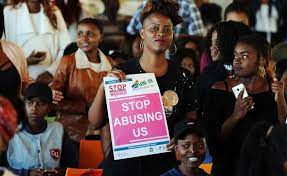Hurtful stories of women being sexually abused, beaten, butchered and killed dominate our communities. It has become a norm that a woman cannot walk alone at night or in a bushy area to prevent the woman from being sexually and physically abused. Such shows the extent in which our communities have become unfriendly and scary for women.
In areas like Matobo and Gwanda districts were the Community Youth Development Trust (CYDT) has been conducting Gender Based Violence (GBV) sensitization programmes, cases of women being sexually and physically abused have been on the rise.
The perpetrators target unsuspecting young women travelling alone in areas with less human movements. For instance many young girls are expected to fetch firewood in nearby forests; it is these areas that the perpetrators lay their ambushes.
There are also cases of sexual violence between women and their partners. A survey conducted by CYDT showed that many boyfriends and husbands fail to respect voices of their partners when they say “NO”. Many boyfriends go on to have sex with their partners despite them saying “NO”. CYDT established that most of these cases go unreported as traditional and cultural beliefs taught them to respect and sexually satisfy their men.
Ways to End Violence against Women
An engagement between young people of Gwanda and Matobo helped come out with important things and strategies to consider to end violence against women. Firstly, it was noted that there is need for communities to respect, listen and believe sexual abuse victims. In many instances, when a young woman tells her parents or those close to her that she has been abused, there is lack of trust and belief. Sometimes, the girl is told to stay silent and never talk about the issue again especially if the perpetrator is a respected known individual. Such situations have kept many stories hidden, as a result, a host of perpetrators are walking free while the victims are extremely hurting inside. For sexual abuse victims to be able to come forward and tell their stories, there is need for them to be assured that they will not be ridiculed by the community. Speaking out should increase the prospects of the victims healing while helping law enforcers arrest the perpetrators. The silencing of victims only lays the foundation of more cases of sexual and physical abuse being conducted by the perpetrators.
Understanding Consent: “NO mean NO”
As already highlighted that a survey conducted by CYDT showed that many men have committed sexual abuse on their partners by failing to understand that No mean No. CYDT saw it imperative to engage young women with their partners to discuss this imperative topic. It was noted that men must understand that when a woman says “NO”, they should not keep forcing and trying to convince them to agree especially those men who wrongfully think it is the cultural and traditional duty of women to sexually satisfy men.
Young women and girls were taught that when they tell their partners “NO” but the partners go on to force them to have sex, they should categorize it as sexual abuse and they should report such cases. Women brought up the issue of cultural and traditional ideologies, saying that they were taught to respect their partners while growing up and that it was their duty to please men. However the organisation taught them that, such beliefs violated their right to say “No”. As a result, the organisation brought to awareness the need to do away with traditional and cultural stereotypes that infringe on young women`s rights.
Understanding Abuse “Tell Signs”
Many young women and girls are not comfortable enough to speak out against abuse. Those who have been violated live with those hurtful memories alone for the rest of their lives. As a result, the organisation saw it imperative to teach young women and men, the “tell signs” of abuse. The tell signs of abuse are those signs one can use to identify victims who could be experiencing sexual abuse. As already highlighted that there are many forms of violence that include sexual and physical abuse. In the case of physical abuse, one can notice the bruises, red-eye or fresh scratches that indicate that someone was being beaten. With sexual abuse, one can notice the way someone speak around sex issues as a hint that someone has experienced sexual abuse. It was noted that if one notices such signs and symptoms on an individual, it is imperative that they notify relevant stakeholders or the parent of the person in question who will then find a way forward.
Speak Out Against sexual abuse, GBV: it’s your duty!
Finally, it was noted that speaking out against GBV and sexual abuse was everyone` s job. It was not a women`s thing to speak against sexual abuse as many people believe. Young men were encouraged to raise the bar in fighting to end violence against women in Zimbabwe. CYDT was pleased by the fact that many young men showed willingness to partake in these activities that seek to empower women by ending violence against them. It was noted that if one witnesses a case of sexual abuse and GBV they should not hesitate calling duty bearers for help. The need to utilise sexual abuse and GBV hotlines as a strategy to facilitate the reporting of sexual abuse cases was encouraged.
Overall, it was established that it takes the whole community to successfully end sexual abuse and GBV. Hence it was imperative that all stakeholders and duty bearers come on board in activities that seek to end violence against women.
Ends//


Recent Comments